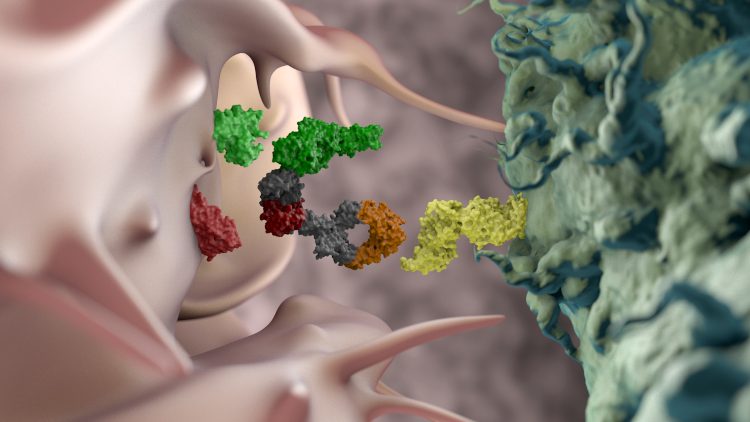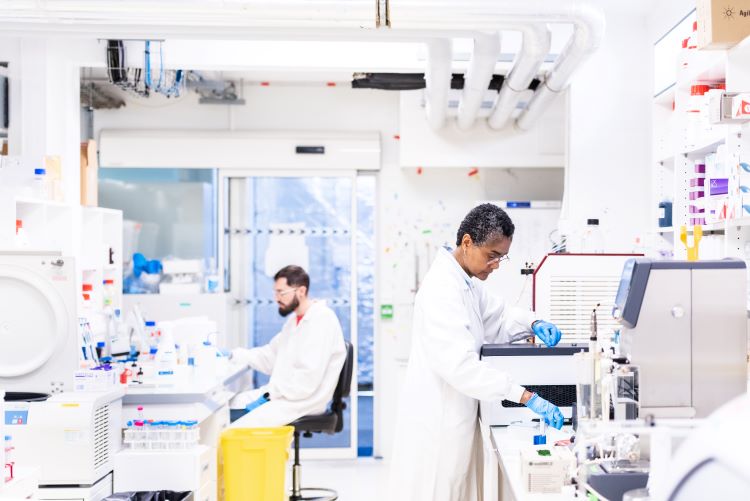NK cell immunotherapy: what’s next in clinical development?
Posted: 12 December 2023 | Catherine Eckford (European Pharmaceutical Review) | No comments yet
In this interview, Innate Pharma’s Yannis Morel, Executive Vice President of product portfolio strategy and business development, delves into the unique advantages of using multi-specific antibodies capable of engaging NK cells against tumours for oncology indications, and shares key data from the company’s ongoing and recent clinical trials.


Credit: Innate Pharma
Yannis Morel, Executive Vice President of product portfolio strategy and business development of Innate Pharma SA, offers insight on engineering antibodies to develop antibody-based NK cell therapeutics. He discusses why NK cell therapy’s ability to generate ‘synthetic immunity’ in the body means this modality holds potential as an anti-cancer treatment.
Additionally, Morel shares highlights and key clinical data from Innate Pharma’s pipeline and as well as his predictions on where the sector is headed, meanwhile considering the impact of accelerating technological innovations.
As a biotech, what work does Innate Pharma do in the biopharma industry?
Innate Pharma is an international clinical-stage biotechnology oncology company based in France. We specialise in the development of new cutting-edge immunotherapies, based on the use of therapeutic antibodies capable of activating the immune system to fight cancer.
Innate Pharma’s approach relies primarily on the innate immune system and aims to mobilise natural killer (NK) cells to directly kill cancer cells through therapeutic antibodies or our proprietary ANKET® (Antibody-based NK cell Engager Therapeutics) platform.
Pharmaceutical companies such as Sanofi and AstraZeneca are currently conducting several high-potential clinical development programmes in oncology in collaboration with Innate Pharma. Innate Pharma has also partnered with Takeda to develop an antibody drug conjugate (ADC).
Can you describe Innate Pharma’s clinical stage pipeline?
Innate Pharma currently has seven clinical-stage assets from Phase I to Phase III.
Our most-advanced proprietary antibody lacutamab is currently being evaluated in a multi-cohort Phase II trial, named TELLOMAK, for the treatment of advanced forms of cutaneous T-cell lymphoma (Sezary syndrome and Mycosis fungoides), and two trials (Phase Ib and Phase II) are ongoing for the treatment of peripheral T-cell lymphoma (PTCL). Final results from the TELLOMAK study are expected by the end of 2023, as well as preliminary data from the Phase Ib trial in PTCL.
The monalizumab antibody licensed to AstraZeneca for oncology is currently being evaluated in a Phase III trial called PACIFIC-9, in non-resectable early-stage non-small cell lung cancer (NSCLC).
Innate Pharma also developing IPH5201 in collaboration with AstraZeneca. IPH5201 is being investigated in a Phase II trial, MATISSE, in combination with durvalumab (anti-PD-L1) and chemotherapy, in patients with resectable early-stage NSCLC .
Additionally, Innate Pharma also has an emerging portfolio of next-generation therapeutics mostly consisting of multi-specific antibodies capable of engaging NK cells against tumours. These are capable of targeting different types of cancer. To date, we are conducting three of these programmes in collaboration with Sanofi. Two are already in Phase I and we have our first proprietary ANKET® called IPH6501 hitting the clinic at the end of this year.


Credit: Innate Pharma
What are some of the biggest advantages to using NK cell therapy to treat cancer?
The innate immune system represents the first line of defense of the organism. Firstly, it initiates the immune response and subsequently helps to activate the adaptive immunity. NK cells are an important component of the innate immunity and their biggest advantage relies on their immediate ability to recognise and eliminate cancer cells through direct killing and to produce cytokines and chemokines that shape the adaptive immune response.
In contrast to NK cells, T cells are not autonomous and need to be primed by the innate immune system before becoming anti-tumour effector cells.
With Innate Pharma’s proprietary next generation multi-specific NK cell engagers platform, multi-specific antibodies bind on one end to activating receptors expressed on NK cells (NKp46, CD16) and on the other end to a tumour antigen expressed on the cancer cells. This co-engagement induces potent NK cell activation and then tumour cell lysis without inducing systemic cytokine release, which is a dose-limiting feature of T cell engagers.
Can you share the results of Innate Pharma’s recent clinical trials?
final data from the TELLOMAK Phase II in Sezary syndrome… [showed that] in heavily pretreated patients post-mogamulizumab, with a median number of six prior therapies… the global objective response rate (ORR) was an encouraging 37.5 percent”
Regarding our clinical trials, the final data from the TELLOMAK Phase II in Sezary syndrome have been accepted for oral presentation at the 2023 annual American Society of Hematology (ASH) meeting. The recently released abstract details that in heavily pretreated patients post-mogamulizumab, with a median number of six prior therapies, the global objective response rate (ORR) was an encouraging 37.5 percent. An ORR of 46.4 percent has been also reported in the skin and 48.2 percent in the blood. A clinical benefit rate of 87.5 percent was observed. A favorable safety profile was also observed.
Additional data from the trial
Moreover, median progression free survival (mPFS) of eight months were shown, altogether confirming in a larger Phase II trial the encouraging efficacy we observed in Phase I and published in Lancet Oncology in 2019.
Beyond Sezary Syndrome, lacutamab showed also preliminary safety and efficacy in TELLOMAK on the first 21 patients having KIR3DL2-expressing Mycosis fungoides with an encouraging global response rate of 28.6 percent, reaching even 57.1 percent in the skin. We are looking forward to getting the final results by the end of the year.
[in the Phase II trial COAST] monalizumab in combination with durvalumab reduce by approximately 60 percent the risk of progression compared to durvalumab alone in patients with unresectable, Stage III NSCLC who had not progressed after concurrent chemoradiation therapy”
The monalizumab Phase III programme in the lung is based on the results of the randomised Phase II trial, called COAST, which showed that monalizumab in combination with durvalumab reduce by approximately 60 percent the risk of progression compared to durvalumab alone in patients with unresectable, Stage III NSCLC who had not progressed after concurrent chemoradiation therapy. Detailed results from COAST were published in the Journal of Clinical Oncology in 2022.
Finally, SAR’579 (SAR443579 / IPH6101) which is targeting CD123 an NKp46/CD16-based NK cell engager (NKCE). In the European Society for Medical Oncology (ESMO) clinical update for relapsed or refractory acute myeloid leukaemia (R/R AML), two of the complete responders previously reported at ASCO remained in remission after 8.8 and 12.2 months of treatment highlighting the durability of these responses.
What top three technologies have the greatest potential to transform the sector and why?
With the evolution of antibody engineering, the field is moving from monospecific antibodies to multi-specific [antibodies]”
With the evolution of antibody engineering, the field is moving from monospecific antibodies to multi-specific ones allowing interactions between receptors and/or cells that were not possible with classical antibodies and that are not naturally occurring during the development of the cancer disease, allowing to create ‘synthetic immunity’ like we are doing with our NK cells engagers by forcing the encounter with the tumour and stimulating 2 activating receptors on NK cells.
Technologies to identify and target tumour-specific antigens that most often are expressed intracellularly and presented at the cell surface through MHC-I will be important to expand the universe of druggable tumour targets.
The progress of the RNA technology and tumour specific vaccination will be also key to increase adaptive immunity against the tumour but also as it participates to the activation of the innate immunity through RNA sensing.
About the interviewee


He has a PhD in oncology from Aix-Marseille University, France and is an alumnus of Ecole Normale Supérieure de Paris-Saclay (previously Cachan) in physical and molecular chemistry.
Related topics
Anti-Cancer Therapeutics, Antibodies, Biologics, Biopharmaceuticals, Clinical Development, Clinical Trials, Data Analysis, Drug Development, Drug Safety, Drug Targets, Immunotherapy, Industry Insight, Pipelines, Research & Development (R&D), Technology, Therapeutics
Related organisations
Related drugs
chemotherapy, durvalumab, Immunotherapy, IPH5201, lacutamab, monalizumab
Related people
Related diseases & conditions
acute myeloid leukemia, mycosis fungoides-type cutaneous T-cell lymphoma (MF-CTCL), non-small cell lung cancer (NSCLC), Sezary syndrome, T-cell lymphoma









